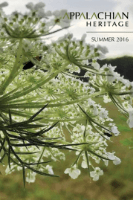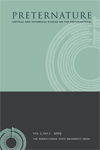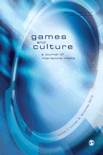
FOLKLORE
Scope & Guideline
Advancing Knowledge in Folklore and Society
Introduction
Aims and Scopes
- Exploration of Mythology and Folklore:
The journal places a strong emphasis on the study of myths and folklore, examining their roles in cultural identity, societal norms, and historical narratives across various cultures. - Cultural and Social Analysis:
Papers often delve into the sociocultural implications of folklore, analyzing how traditional narratives shape community values, beliefs, and practices. - Interdisciplinary Approaches:
'FOLKLORE' promotes interdisciplinary research, inviting contributions that integrate perspectives from anthropology, literature, history, and cultural studies, thereby enriching the discourse surrounding folklore. - Focus on Contemporary Issues:
The journal addresses contemporary themes, such as the impact of technology and globalization on traditional folklore, revealing how age-old narratives adapt to modern contexts. - Preservation and Revitalization of Cultural Heritage:
A significant aim is to highlight efforts in preserving and revitalizing endangered folklore and cultural practices, emphasizing their importance in sustaining cultural diversity.
Trending and Emerging
- Folklore and Digital Media:
An increasing number of articles explore the intersection of folklore and digital media, examining how social media and technology influence the dissemination and transformation of traditional narratives. - Environmental and Ecological Folklore:
Research addressing the relationship between folklore and environmental issues is on the rise, highlighting how traditional narratives can inform contemporary ecological understandings and practices. - Gender and Folklore:
There is a significant trend towards analyzing gender roles and representations within folklore, with a focus on how narratives reflect and challenge societal norms regarding gender. - Globalization and Cultural Exchange:
Emerging studies investigate the impacts of globalization on folklore, including the hybridization of narratives and the ways in which cultural exchanges reshape traditional stories. - Health and Folklore:
Recent publications indicate a growing interest in the relationship between folklore and health, particularly in how traditional narratives inform understandings of health practices and beliefs in various cultures.
Declining or Waning
- Traditional Folklore in Isolation:
There appears to be a declining focus on traditional folklore studies that do not engage with contemporary cultural dynamics. Papers solely focused on historical folklore without contextual relevance to modern society are less frequently published. - Narrow Cultural Studies:
Research that concentrates solely on a single cultural or regional folklore without comparative perspectives has become less prevalent, as the journal increasingly emphasizes interdisciplinary and cross-cultural analyses. - Static Methodological Approaches:
There has been a noticeable decrease in papers employing static or outdated methodologies in folklore research. The journal now favors innovative and dynamic research methodologies that reflect current academic standards.
Similar Journals

OSTERREICHISCHE ZEITSCHRIFT FUR VOLKSKUNDE
Connecting Research to Cultural UnderstandingOSTERREICHISCHE ZEITSCHRIFT FUR VOLKSKUNDE is a dedicated academic journal published by the VEREIN FUR VOLKSKUNDE that focuses on the interdisciplinary study of folklore and ethnology, particularly in the Austrian context. With a long-standing history of contributing to cultural studies, this journal serves as an essential resource for researchers, professionals, and students interested in the nuances of social practices, traditions, and cultural narratives. Although it has ceased its indexing in Scopus as of 2019, its impact is reflected in its rankings, particularly in the categories of Social Sciences and Arts and Humanities, making it a crucial reference point for those studying cultural phenomena. The journal, with ISSN 0029-9669, is based in Vienna, Austria, and offers a rich compendium of articles that promote scholarly discourse and broaden understanding in the field of Volkskunde. As it continues to foster academic dialogue, OSTERREICHISCHE ZEITSCHRIFT FUR VOLKSKUNDE remains a notable contributor to the evolution of cultural studies in the region and beyond.

VOLKSKUNDE
Diving into the Heart of Cultural PracticesVOLKSKUNDE is a distinguished academic journal dedicated to the study of folklore and cultural traditions, published by CENTRUM STUDIE DOCUMENTATIE based in Belgium. With an ISSN of 0042-8523, this journal serves as an essential platform for researchers, scholars, and students interested in the rich tapestry of cultural heritage and ethnographic research. Although currently not available as an open-access publication, VOLKSKUNDE is committed to disseminating high-quality scholarly articles that provide critical insights into the complexities of cultural practices across diverse societies. The journal’s objective is to foster academic discourse and stimulate inquiry into folklore studies, promoting a deeper understanding of cultural dynamics. By engaging with a broad range of topics within its scope, VOLKSKUNDE is an invaluable resource for anyone looking to deepen their knowledge in the field of folkloristics.

Folklore-Electronic Journal of Folklore
Fostering Scholarly Exchange in Folklore StudiesFolklore-Electronic Journal of Folklore is a pioneering academic platform dedicated to the expansive field of folklore studies, published by the esteemed Estonian Literary Museum. With an ISSN of 1406-0957 and an E-ISSN of 1406-0949, this journal has established itself as a notable contributor to the scholarship on cultural expressions and traditions, particularly in the context of Estonia and beyond. Operating under an open access model, the journal aims to disseminate high-quality research that illuminates the rich tapestry of human folklore, mythology, and cultural practices across various societies. Recognized for its impact, it has been categorized in the Q3 quartile for Anthropology and Q2 for Cultural Studies in 2023, reflecting its relevance and rigorous academic standards. By ranking #436 out of 1304 in Cultural Studies and #267 out of 502 in Anthropology according to Scopus, the journal serves as a vital resource for researchers, professionals, and students interested in the interplay between folklore and contemporary societal issues. Overall, the Folklore-Electronic Journal of Folklore not only promotes scholarly exchange but also invites contributions that push the boundaries of traditional folklore research.

Architecture and Culture
Illuminating the Cultural Dimensions of ArchitectureArchitecture and Culture is an esteemed journal published by Routledge Journals, Taylor & Francis Ltd, focusing on the intersection of architecture, cultural studies, urbanism, and the visual and performing arts. Since its inception, this journal has become a vital platform for researchers, professionals, and students to explore the multifaceted relationship between architecture and cultural identity within contemporary contexts. With an ISSN of 2050-7828 and an E-ISSN of 2050-7836, the journal reaches a global audience from its base in the United Kingdom. Featuring a commendable Q2 ranking in Visual Arts and Performing Arts and a consistent presence in multiple relevant quartiles, including Q3 in both Architecture and Cultural Studies, it is well-regarded for its scholarly impact. The journal offers a unique opportunity for interdisciplinary dialogue, fostering innovative research that examines how built environments shape and are shaped by cultural narratives. This commitment to advancing knowledge in these fields is reflected in its ongoing publication from 2014 to 2024, making it a pivotal resource for those at the forefront of the discourse on architecture and culture.

Folklor/Edebiyat-Folklore/Literature
Empowering Voices: Sharing Folkloric Narratives Across BordersFolklor/Edebiyat-Folklore/Literature is an esteemed interdisciplinary journal dedicated to the exploration of folklore and literature, published by Rector CIU Cyprus International University. Established as a crucial platform for scholarly discourse, it has been an Open Access journal since 2015, empowering researchers and students from around the globe to share their findings without barriers. With its ISSN 1300-7491 and E-ISSN 2791-6057, the journal aims to bridge the gap between Anthropology, Cultural Studies, and History, as reflected in its commendable ranking in the 2023 Category Quartiles, where it holds Q3 in Anthropology and Q2 in both Cultural Studies and History. The journal is essential for anyone looking to deepen their understanding of folkloric narratives and their literary implications, contributing significantly to ongoing dialogues in these vibrant fields of study. Set in the culturally rich context of Cyprus, and operating within a converged time frame from 2018 to 2024, Folklor/Edebiyat serves as a dynamic resource for researchers, professionals, and students alike, providing access to a diverse range of scholarly articles that inspire new interpretations and discussions.

Appalachian Heritage-A Literary Quarterly of the Southern Appalachians
Celebrating the Soul of Southern AppalachiaAppalachian Heritage is a distinguished literary quarterly dedicated to exploring the rich cultural tapestry of the Southern Appalachians, published by the University of North Carolina Press. With a focus on literature, folklore, and the arts, this journal serves as a vital platform for scholars, writers, and enthusiasts alike. Through its thoughtfully curated content, Appalachian Heritage not only celebrates the unique voices and stories of this region but also contributes to a broader understanding of Appalachian identity within the greater context of American literature. While the journal operates under traditional access models, its editorial commitment to quality and cultural relevance ensures that it remains an essential resource for those seeking to delve into the literary heritage of the Southern Appalachians. The journal features a blend of academic articles, creative works, and critical essays that engage with themes of place, memory, and community, making it a must-read for anyone invested in the intersection of literature and culture.

Preternature-Critical and Historical Studies on the Preternatural
Charting New Realms: Critical Studies on the PreternaturalPreternature: Critical and Historical Studies on the Preternatural, published by Penn State University Press, stands at the intersection of Anthropology, Cultural Studies, and History, making it a distinctive voice in the exploration of the preternatural across various contexts. Since its inception in 2017, this journal has provided a platform for scholars to examine the complexities of human relationships with the extraordinary, the supernatural, and the eerie. Although it currently does not offer open access options, its insights are vital for understanding the historical and contemporary implications of preternatural phenomena. With its 2023 rankings reflecting a Q4 in Anthropology and Q3 in both Cultural Studies and History, Preternature serves as a crucial resource for researchers and professionals seeking to navigate the intricate narratives surrounding the preternatural in societies worldwide. Engaging with diverse theoretical frameworks, this journal not only contributes to academic discourse but also fosters interdisciplinary dialogues, making it essential reading for anyone invested in expanding the boundaries of their respective fields.

Rusin
Unveiling the Depths of Human Experience and ThoughtRusin is a distinguished academic journal published by ASSOC RUS in Moldova, playing a pivotal role in the multidisciplinary landscape of the humanities and social sciences. With an ISSN of 1857-2685 and an E-ISSN of 2345-1149, this journal has been circulating since 2011, amassing a significant reputation by 2023 as evidenced by its prestigious quartile rankings: Q2 in Anthropology, Q1 in History, Q2 in Linguistics and Language, Q1 in Literature and Literary Theory, and Q3 in Sociology and Political Science. The journal boasts remarkable Scopus rankings, including an impressive rank of #145 in Literature and Literary Theory, placing it in the 86th percentile among its peers. Although currently not open access, Rusin serves as an essential platform for researchers, professionals, and students, aiming to further the understanding of complex cultural and historical narratives, language evolution, and sociopolitical dynamics. As an informative resource, it fosters critical dialogue and interdisciplinary collaboration, solidifying its importance in the publishing realm within the humanities and social sciences.

Games and Culture
Connecting Worlds: Where Gaming Meets CultureGames and Culture is a premier interdisciplinary journal published by SAGE Publications Inc, focusing on the rich intersection of gaming, culture, and society. With an ISSN of 1555-4120 and an E-ISSN of 1555-4139, this esteemed journal facilitates critical discussions and innovative research contributions in fields ranging from anthropology and communication to applied psychology and cultural studies. Its exceptional standing is reflected in its various Scopus rankings, placing it in the 99th percentile for Cultural Studies and the 98th percentile for Anthropology, among others. Covering research from its inception in 2006 through 2024, Games and Culture is devoted to advancing the understanding of how games influence cultural expressions and vice versa, making it an invaluable resource for academics, practitioners, and students alike. While the journal is not open access, its comprehensive scope and high-impact findings ensure that it remains a crucial platform for scholarly exchange and discovery in understanding the increasingly significant role of gaming in contemporary culture.

Culture and Dialogue
Unraveling the Complex Tapestry of Human InteractionCulture and Dialogue is a prominent journal published by BRILL, dedicated to exploring the intricate relationships between culture, communication, and societal dynamics. With an ISSN of 2222-3282 and an E-ISSN of 2468-3949, this journal serves as a vital platform for disseminating research that bridges various academic disciplines, including cultural studies, anthropology, and communication theory. Positioned in the Netherlands, it benefits from BRILL's esteemed reputation in scholarly publishing, ensuring high visibility and accessibility within the academic community. The journal aims to foster a deeper understanding of cultural narratives and dialogues, highlighting their significance in contemporary society. As an invaluable resource for researchers, professionals, and students eager to engage with cutting-edge discussions, Culture and Dialogue contributes significantly to the advancement of knowledge in its field.